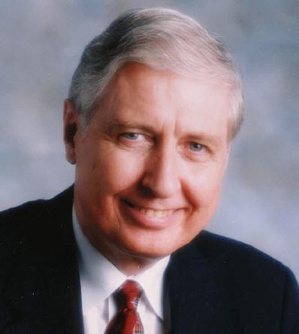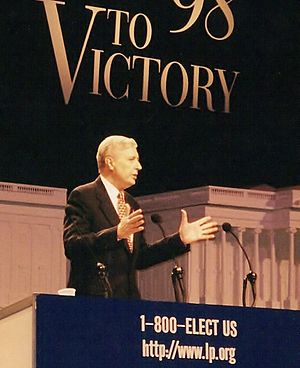Harry Browne facts for kids
Quick facts for kids
Harry Browne
|
|
|---|---|
 |
|
| Born |
Harry Edson Browne
June 17, 1933 New York City, New York, U.S.
|
| Died | March 1, 2006 (aged 72) |
| Nationality | American |
| Height | 6 ft. 4 in |
| Political party | Libertarian |
| Spouse(s) | Pamela Lanier Wolfe |
| Children | Autumn |
Harry Edson Browne (born June 17, 1933 – died March 1, 2006) was an American writer, politician, and investment advisor. An investment advisor helps people decide how to save and grow their money. Harry Browne was the Libertarian Party's candidate for President in the U.S. elections of 1996 and 2000. He wrote 12 books that sold more than 2 million copies in total.
Contents
Harry Browne's Career Journey
Military Service
Harry Browne joined the U.S. Army on May 5, 1953. He went to a training center in California to study cryptography. This is the art of writing and solving secret codes. On October 4, 1953, he was sent to Bikini Atoll in the Marshall Islands. This was where the 1954 Operation Castle hydrogen bomb tests took place. A hydrogen bomb is a very powerful type of nuclear weapon.
In 1955, Browne finished his time in the Army. He was honorably discharged from active military service in 1956. He left the Army Reserves in 1961.
Activist and Author
In the 1960s, Harry Browne worked in advertising and sales. Later, he focused on promoting what he called the "Americanist" cause. This meant he believed strongly in American values and ways of life. In 1961, he started a newspaper service called American Way Features, Inc. He wanted to sell articles that promoted American ideas. His own column, "The American Way," appeared in over 200 newspapers.
He also became the editor of a magazine called Freedom Magazine. He worked there until 1964.
Investment Ideas and the "Permanent Portfolio"
Harry Browne taught courses on money and success. He was an investment advisor for many years. He created an investment plan called the "permanent portfolio" strategy. This plan suggests that there are four main types of economic conditions. It recommends investing in different things to make money when times are good and to stay safe when times are tough.
Browne wrote his first book, How You Can Profit From The Coming Devaluation, in 1970. His second book, How I Found Freedom in an Unfree World, came out in 1973. He continued to write many books about money and living a free life. One of his popular books was Fail-Safe Investing: Lifelong Financial Security in 30 Minutes, published in 2001. He also gave talks about living a "libertarian lifestyle." This means living in a way that values personal freedom and limited government.
Presidential Campaigns
Harry Browne was the presidential candidate for the Libertarian Party in the elections of 1996 and 2000. In 1996, he received about 485,000 votes. In 2000, he received about 384,000 votes.
His campaigns could have received money from the government, called "matching funds." However, Browne chose not to accept this money. He believed it was wrong to take government funds when he was against government spending. He said it would be "highly inappropriate" for him to do so. This decision earned him praise from people who agreed with his views. During both elections, the Libertarian Party was on the ballot in all 50 states.
Later Life and Work
After the 2000 election, Harry Browne kept working to spread libertarian ideas. He helped start an organization called the Downsize DC Foundation. This group wants to make the government smaller. He also hosted two weekly radio shows. One show was about politics, and the other was about money. These shows were on the Genesis Communications Network.
Browne also worked with the Free Market News Network. He had his own internet TV show called This Week in Liberty. Before he passed away, he was writing a book called The War Racket. In this book, he argued that war is just another government program. He believed that "government never solves anything." He had read over 400 books for this project.
Harry Browne also wrote thousands of articles. He contributed to websites like LewRockwell.com, Antiwar.com, and World Net Daily. From 1974 to 1997, he published a financial newsletter called Harry Browne Special Reports.
Death
Harry Browne died on March 1, 2006. He was 72 years old. He passed away at his home in Franklin, Tennessee. The cause of his death was Lou Gehrig's disease. This is a serious illness that affects the nerves and muscles. Later that month, U.S. Congressman Ron Paul gave a speech honoring Harry Browne.
See also
 In Spanish: Harry Browne para niños
In Spanish: Harry Browne para niños
 | Tommie Smith |
 | Simone Manuel |
 | Shani Davis |
 | Simone Biles |
 | Alice Coachman |


